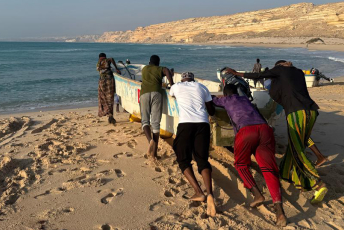Masai giraffe calves and other juvenile African wildlife are being exported from Tanzania to the Sharjah Safari in Al Dhaid in the United Arab Emirates (UAE) for the pleasure of Dubai royalty and tourists.
Human Rights Watch reports that the shooting and capture of animals, including the endangered Masai giraffe, and their transfer to Dubai are part of a long-running syndicate between successive Tanzanian governments and the Otterlo (sometimes Ortello) Business Corporation (OBC). This syndicate has been active since Ali Hassan Mwinyi’s presidency in the 1980s and 1990s.
Institute for Security Studies Researcher Nicodemus Minde said there were deep-rooted connections between the Tanzanian political elite and UAE ruling class in facilitating hunting concessions that have violated Tanzania’s wildlife laws. He linked senior members of Tanzania’s ruling Chama Cha Mapinduzi party and UAE royalty, who had been accused of poaching and transporting live animals to Dubai.
The Masai giraffe, Tanzania’s national animal, was originally at the centre of Loliondogate – a scandal that broke in 2017 in which hunting concessions were given to specific hunting companies, violating several laws. The biggest recipient of these concessions was OBC, which registered as a foreign company in Tanzania under the trade name Royal Safaris Conservation in 1992.
Operating from the Ngorongoro District’s Loliondo area in Northern Tanzania, the company had links to prominent UAE royals. Amnesty International reports that a high-ranking member of the Tanzanian ruling party, Abdulrahaman Kinana, was frequently present in the Loliondo area during the hunting expeditions organised for the Dubai royals.
First, OBC hunters were authorised by state officials to kill the giraffe in contravention of the Wildlife Conservation Act of 2022. The Masai giraffe, also found in Kenya, is listed as endangered by the International Union for Conservation of Nature. Estimates of how many remain in the wild vary between 45 000 and 32 000 – compared to over 70 000 three decades ago. In addition to trophy hunting, the giraffe are also hunted locally for bushmeat. Some communities believe its meat can be used for traditional medicine.
Second, it is reported that OBC hunters started fires to trap baby lions, leopards and ostriches to prevent them from escaping to Kenya or into Tanzania’s Serengeti National Park – and enabling them to be captured. Ted Botha, a conservation journalist and author, said from 2000 to 2017, up to 100 animals were captured and transferred to Dubai weekly.
Third, after the female animals were shot, their offspring were caged and moved to Dubai in contravention of the Wildlife Conservation Act of 2022.
Although the Tanzanian government issued a ban on the transfer of animals to Dubai in 2017, new reports indicate that this practice continues – and is threatening the sustainability of the Masai giraffe in Northern Tanzania.
A 2024 Amnesty International investigative report in Kirtalo and Ololosokwan near the Pololeti Game Reserve recorded incidents where juvenile animals, especially giraffes and zebras, were being caged and transferred to Kilimanjaro airport. From there they were being loaded into cargo planes headed for Dubai.
In a recent case in Tanzania’s High Court, seven former OBC employees sued the company for unfair termination. As evidence of their contractual engagement with OBC, they produced expired security passes that indicated they had been authorised to transport live wildlife to Kilimanjaro airport for onward passage to Dubai.
Evidence based on Tanzania’s exports to Dubai in 2023 indicates that it made 72 shipments of ‘bushmeat’ to Dubai. Amnesty International believes these shipments of both live and dead animals were the result of those captured or killed in the hunting expeditions in the Loliondo area.
On the Dubai side, according to an exposé by journalist Diego Muller, most of the juvenile animals airlifted from Kilimanjaro airport end up at Sharjah Safari – where they are kept to boost the UAE tourism industry.
Even though Tanzania’s Wildlife Conservation Act allows for supervised hunting of specific species, the hunting concessions awarded to OBC that see the killing of endangered species and the capture and caging of juvenile animals break this law.
Given the prominence of the UAE royal families and their involvement in illicit hunting in Tanzania, a global campaign by conservation groups such as the World Wildlife Fund and TRAFFIC, in collaboration with global advocacy organisations such as Amnesty International, is needed. This campaign could bring attention to the case of hunting concessions that facilitate the smuggling of endangered species to Dubai.
Willis Okumu, Senior Researcher, ENACT
Image: Nirav Shah/Pexels







